- Home
- Tahereh Mafi
Believe Me Page 4
Believe Me Read online
Page 4
She drops her emotional armor for only a second, but I feel it: the weight of her grief is profound.
“We’re drowning,” she says quietly, running a hand down her face. “We need help. We lost too many of our own in the battle. The Sanctuary is falling apart, and we don’t have time to rebuild slowly. The whole world is watching us now. We need more hands on deck, more crews to come in and help us do the work. If we don’t, we’re going to fail before we’ve even had a chance to start.”
For a moment, I’m silent.
Nouria’s not wrong; the Sanctuary is a disaster. So, too, is the planet. I’ve already sent Haider and Stephan and Lena and the twins back to their respective continents; we needed capable proxies on the ground assessing the current situation abroad—neutralizing chaos wherever possible— and no one was better suited. Nazeera is the only one who stayed behind, claiming that Haider would be fine on his own, that she wanted to stick around for my wedding. I might’ve been flattered by this nonsense if I didn’t know she was lying.
She wanted to stay here to be with Kenji.
Still, I’ve been grateful for her presence. Nazeera is smart and resourceful and has been an immense help these last couple of weeks. The Sanctuary had enough to do when it was trying only to keep its own people alive; now the entire world is looking to us for direction.
Looking to Ella for direction.
What they don’t know, of course, is that she’s been conscious for only four days. When she finally woke up there was so much for her to do—the world had been waiting for proof that Juliette Ferrars had survived—and despite my many, many protests, she agreed to make limited appearances, to issue statements, to begin discussing what the future might look like for the people. She insisted that we get started right away, that we put together a committee responsible for designing the world’s largest public works project—rebuilding towns, schools, hospitals. Investing in infrastructure. Creating jobs, remapping cities.
On a global scale.
Even so, there’s hardly been time to think about these things. I spent most of the last two weeks doing what I could to keep Ella alive while trying to put out as many fires as possible. In a moment of honesty I might even be willing to admit that Kenji’s mistake—knocking down the wrong building—was almost inevitable. There is an infinite number of things to do and never enough people to do it, or to oversee the details.
Which means we’re often making mistakes.
On a micro level, we’re also required to pitch in, rebuild our cabins. Cut the grass. Cook the food. Wash the dishes. Ella dragged me into the kitchen as soon as she was able, slapping a pair of questionable rubber gloves against my chest before tugging on a grimy pair of her own, all the while grinning at the gluey bottom of an oatmeal-encrusted cauldron like it was a gift. If Ella were a house, she would be a grand home, one with many rooms and doors, all of which were easily unlocked, flung open.
If I were a house, I would be haunted.
“And I would remind you,” Nouria says, her brittle voice returning me to the present, “that you are not the only person on earth ever to have been married. I’m sorry you can’t bear to be separated from your fiancée long enough to have a single vital discussion about our failing world, but the rest of us must continue to move, Warner, even if it means deprioritizing your personal happiness.”
Her words strike a raw nerve.
“Too true,” I say quietly. “There are few, indeed, who’ve ever prioritized my personal happiness. I wouldn’t expect you to be the exception.”
I regret the words the moment they’ve left my mouth.
I steel myself as Nouria reels, processing my uncomfortable moment of honesty. She looks away, guilt flickering, fighting with irritation. Her anger ultimately wins the battle, but when she meets my eyes again, there’s a note of regret there, in her gaze, and I realize only then that I have been tricked.
There is more.
I take an imperceptible breath; the true purpose of this meeting is only now about to be revealed to me.
“While we’re on the subject,” Nouria says, sparing her father an anxious glance. “I—well. I’m really sorry, Warner, but we’re going to have to postpone the wedding.”
I stare at her.
My body goes slowly solid, a dull panic working its way through my nervous system. I feel multiple things at once— anger, grief, confusion. A strange sort of resignation rises up above them all, crowning a familiar pain, a familiar fear: that joy, like dew, evaporates from my life the moment I begin to trust the sun.
This is it, then. Par for the course.
“Postpone the wedding,” I say, hollow.
“Today is just turning out to be a bad day for everyone,” she says, rushing to get the words out. “There’s too much going on. There’s a major sewage problem we need to get under control, which is using up most of our manpower at the moment, and everyone else is knee-deep in other projects. We don’t have enough hands to set up or break things down—and we tried, we really tried to make it work, but we just can’t spare the generator tonight. Our electricity has been touch and go, and the temperatures are supposed to be brutal tonight; we can’t let the kids freeze in their beds.”
“I don’t understand. I spoke with Brendan, he offered—”
“Brendan is drained. We’ve been relying on him too much lately. Winston has already threatened to kill me if we don’t let him sleep tonight.”
“I see.” I stare at the table, then my hands. I have turned to stone, even as my heart races in my chest. “We’d need the generator for only an hour.”
“An hour?” Nouria laughs, but she seems unnerved. “Have you ever been to a wedding? Outside? At night? You’d need lights and heat and music. Not to mention all that we’d have to do to get the kitchen going that late, and distributing food— We never got around to making a cake—”
“I don’t need a wedding,” I say, cutting her off. I sound strange even to myself, nervous. “I just need an officiant. It doesn’t have to be a big deal.”
“I think it might be a big deal to Juliette.”
I look up at that.
I have no worthy response; I can’t speak for Ella. I’d never deny her a real wedding if it’s what she wants.
The whole thing feels suddenly doomed. The day after I proposed to Ella, she was attacked by her sister, after which she fell into a coma and came home to me nearly dead. We were supposed to have been married this morning, except that her dress was destroyed, and now—
“Postpone until when?”
“I’m not sure, if I’m being honest.” Nouria’s nerves and apprehension are growing louder now. I try to meet her eyes, but she keeps glancing at Castle, who only shakes his head. “I was hoping maybe we could look at the calendar,” she says to me, “think about planning something when things are less crazy around here—”
“You can’t be serious.”
“Of course I’m serious.”
“You know as well as I do,” I say angrily, “that there is no guarantee things will ever calm down around here, or that we’ll ever be able to get this situation under control—”
“Well, right now is a bad time, okay?” She crosses her arms. “It’s just a bad time.”
I look away. My heart seems to be racing in my head now, pounding against my skull. I feel myself dissociating— detaching from the moment—and struggle to remain present.
“Is this some kind of perverse revenge?” I ask. “Are you trying to prevent my wedding because I won’t let you bring in civilians? Because I refuse to put Juliette’s life in jeopardy?”
Nouria is quiet for so long I’m forced to look up, to return my mind to itself. She’s staring at me with the strangest look in her eyes, something like guilt—or regret—washing her out completely.
“Warner,” she says quietly. “It was Juliette’s idea.”
FIVE
The small velvet box weighs heavy in my pocket, the right angles of which dig into my thigh a
s I sit here, at the edge of a short cliff, staring down at our very own graveyard. This area was built shortly after the battle—a memorial to all the lives lost.
It’s become an unexpected refuge for me.
Few people come through here anymore; for some, the pain is still too fresh, for others, the demands on their time too many. Either way, I’m grateful for the quiet. It was one of the only places to escape while Ella was in recovery, which meant I spent quite a bit of time acquainting myself with this view, and with my seat: a smooth, flat stretch of a massive boulder. The view from this rock is surprisingly peaceful.
Today, it fails to calm me.
I hear a sound then; a distant, faded trill my mind can only describe as birdsong. The dog lifts its head and barks.
I stare at the animal.
The dirty little creature waited for me outside the war room only to follow me here. I’ve done nothing to inspire its loyalty. I don’t know how to get rid of him. Or her.
As if sensing the direction of my thoughts, the dog turns to face me, panting lightly now, looking for all the world as if it might be smiling. I’ve hardly had a chance to digest this before it jerks away to bark once more at the sky.
That oddly familiar chirp, again.
I’ve heard birdsong more often lately; we all have. Castle, who’s always insisted all was not lost, claims even now that the animals had not died out entirely. He said that traditionally, birds hide during severe weather, not unlike humans. They seek shelter when experiencing illness, too, during what they believe to be the last moments of their life. He argues that the birds went into mass hiding—either from fear, or from sickness—and that now, with Emmaline’s weather manipulations gone, what’s left of them have come out of hiding. It’s not a foolproof theory, but lately it’s grown harder to deny. Even I find myself searching the sky these days, hoping for a glimpse of the impossible creature.
A cold wind barrels through the valley then, pushing through my hair, snapping against my skin. It is with some regret that I realize I left my coat in the war room. The dog whimpers, nudging my leg with its nose. Reluctantly, I rest my hand on what is no doubt its flea-infested head, and the dog quiets. Its thin body curls into a tight ball at my feet, tail tapping the ground.
I sigh.
The day had dawned bright this morning, the sun unencumbered in the sky, but each passing hour has brought with it heavier clouds and an inescapable chill.
Nouria was right; this night will be brutal.
Anxious as I always am to be apart from Ella, my impulses were blunted after meeting with Castle and Nouria. Confused. I wanted nothing more than to seek out Ella; I wanted nothing more than to be alone. I ended up here, in the end—my feet carrying me when my head made no decision—staring into a valley of death, circling the drain of my mind. This morning had been agitating but rewarding; full of irritation but hope, too. I hadn’t resented the ticking clock against which I’d been marking time.
In the end, the afternoon has proven empty.
My evening, cleared.
Save the myriad domestic and international disasters that remain unresolved, I’ve no reason to hurry anymore. I’d thought I was getting married tonight.
As it turns out, I’m not.
I tug free the velvet box from my pocket, clutching it in my fist a moment before taking a sharp breath, then carefully opening the lid. I stare at the glittering contents not unlike a child witnessing fire for the first time. Naive.
It’s strange: of all the reprehensible things I’ve known myself to be, I’d never thought I was stupid.
I snap the lid closed, tuck the box back into my pocket.
Nouria didn’t lie when she said my wedding wouldn’t happen tonight. She didn’t lie when she told me it was Ella’s idea to postpone. What I don’t understand is why Ella never mentioned this to me—or why she said nothing this morning at the dress shop. Perhaps most confusing of all: I’ve felt no hesitation from her on the matter. Surely, if she didn’t want to marry me, I’d have known.
I clench my jaw against the cold.
Somehow, despite the howling wind, the dog appears to have fallen asleep, its body vibrating like a small motor at my feet. I take a moment to study its patchy brown fur, noticing, for the first time, that there’s a piece missing from one of its ears.
I exhale, slowly, and rest my elbows on my knees, drop my head into my hands. The small box digs deeper into my flesh.
I’m trying to convince myself to get going—to return to work—when I feel Ella approach. I stiffen, then straighten.
My pulse picks up.
I sense her long before I see her, and when she finally comes into view my heart reacts, contracting in my chest even as my body remains motionless. She lifts a hand when she sees me, the single moment of distraction costing her a fight with a bramble. This area, like so many others, is carpeted in half-dead brush, ripe for a wildfire. Ella struggles to disentangle herself, yanking hard to free her shirt—and promptly frowns when she’s released. She studies what appears to be the torn edge of her sweater before looking up at me. She shrugs.
I didn’t really care about this sweater anyway, she seems to say, and I can’t help but smile.
Ella laughs.
She is windswept. The gusts are growing more aggressive, whipping her hair so that it wraps around her face as she heads in my direction. I can hardly see her eyes; only glimpses of her lips and cheeks, pink with exertion. She swipes at her dark hair with one hand, pushing at overgrown weeds with the other. She is gently rendered in this light, soft in a nondescript sweater the color of moss. Dark jeans. Tennis shoes.
The light changes as she moves, the clouds fighting to hide the sun and occasionally failing. It makes the scene feel dreamlike. She looks so much like herself in this moment that it startles me; it’s almost as if she’s stepped out of some of my favorite memories.
“I’ve been looking for you everywhere,” she says breathlessly, laughing as she collapses beside me on the boulder. She smells like apricot—it’s a new shampoo—and the scent of it fills my head.
She pokes me in the stomach. “Where’ve you been?”
“Here.”
“Very funny,” she says, but her smile fades as she studies my face. I find it difficult to meet her gaze.
“Hey,” she says softly.
“Hi,” I say.
“What’s wrong?”
I shake my head slowly. “Nothing.”
“Liar,” she whispers.
I close my eyes.
I feel myself change when she’s near me; the effect is powerful. My body unclenches, my limbs grow heavy. All the tension I carry seems to melt away, taking with it my resolve; I become almost lethargic with relief.
I take a shallow breath.
“Hey,” she says again, touching her cool fingers to my face, grazing my cheek. “Who do I have to kill?”
I pull away, smiling faintly at the ground when I say, “Did you tell Nouria you wanted to postpone our wedding?”
Ella’s horror is immediate.
She sits back and stares at me, fear and shock and anger coalescing into a single, indistinguishable mass of feeling. I avert my eyes as she processes my question, but her reaction does quite a bit to ameliorate my headspace. Just until she says—
“Yes.”
I go unnaturally still.
“But Nouria wasn’t supposed to tell you that.”
I look up at her then. Ella is trying to hide her panic from me. She looks away, looks into her hands. I don’t understand what’s happening, and I say this out loud.
Ella can’t stop shaking her head. She clasps her hands tight. “Nouria wasn’t supposed to tell you that. That wasn’t—she wasn’t—”
“But it’s true.”
Ella meets my eyes. “It’s technically true, yes, but she shouldn’t have— She shouldn’t have been the one to say that to you. Nouria and I discussed this a couple of days ago. I’d said that if we couldn’t—if we could
n’t pull things together in time, that maybe, maybe we could wait—”
“Oh.” I squint up into the sky, searching for the sun.
“I was going to tell you myself,” she says, more quietly now. “I was just waiting to know . . . more. About how today might turn out. There were some unexpected setbacks this morning, which cost us a lot of time, but I was still hoping we’d be able to figure everything out. Everyone has been working really hard—Kenji told me there was a chance we could still pull it all together today, but if Nouria—”
“I see.” I push a hand through my hair, drag it down my neck. “So you discussed this with everyone? Everyone but me.”
“Aaron. I’m so sorry. This sounds horrible. I hear it—I hear myself saying it, and I hear how horrible it sounds.”
I take a deep, shaky breath. I don’t know what to do with my arms, or my legs. They feel prickly suddenly; all pins and needles. I want to tear them off my body.
I’m staring at the ground when I say, “Have you changed your mind? About marrying me?”
“No,” she says, the word and the emotional force behind it so potent I’m compelled to look up. I see the anguish in her eyes, and I feel it, too; she seems racked with guilt and resignation, an unusual combination of feelings I can’t parse. But her love for me is palpable. She takes my hands and the feeling magnifies, flooding my body with a relief so acute I want to lie down.
Something seems to unclench in my chest.
“I love you,” she whispers. “I love you so much. I just want to do this right—for both of us. I want you to have a beautiful wedding. I think it matters more to you than you think.”
“It doesn’t,” I say, shaking my head. “I don’t care, love. I don’t care about any of it. I just want you. I want you to be my family.”
She doesn’t argue with me. Instead, she squeezes my fingers as her emotions spiral, compound. I close my eyes against the force of it. When I finally look up again, her eyes are shining with unshed tears.
The sight drives a stake into my heart.
“No,” I whisper, brushing the backs of my fingers along her jaw, the skin there cold and silken. “Postpone the wedding for as long as you want. We can get married whenever you want, I don’t care.”

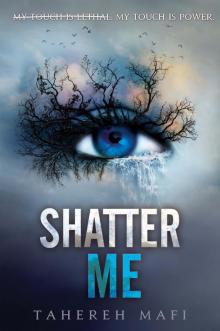 Shatter Me
Shatter Me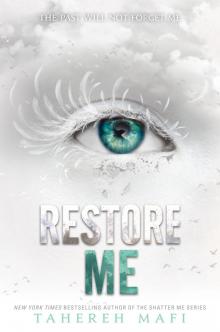 Restore Me
Restore Me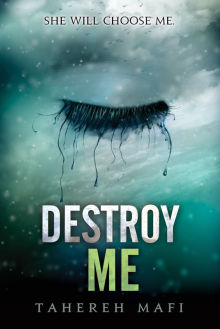 Destroy Me
Destroy Me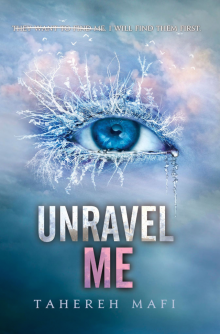 Unravel Me
Unravel Me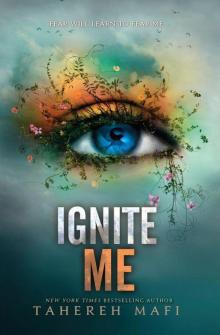 Ignite Me
Ignite Me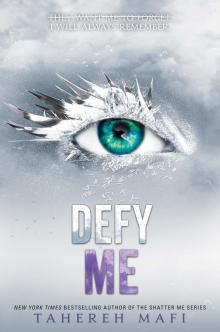 Defy Me
Defy Me Fracture Me
Fracture Me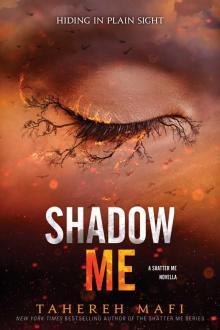 Shadow Me
Shadow Me Whichwood
Whichwood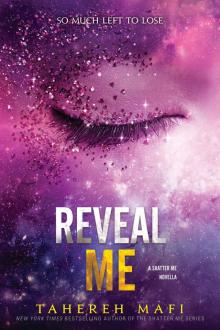 Reveal Me
Reveal Me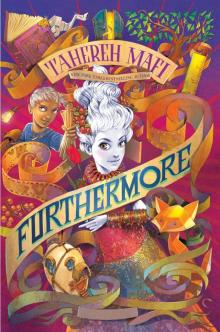 Furthermore
Furthermore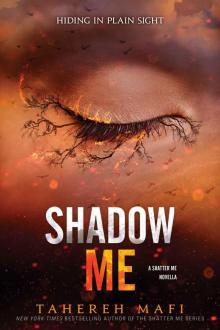 Shadow Me (Shatter Me Novella)
Shadow Me (Shatter Me Novella)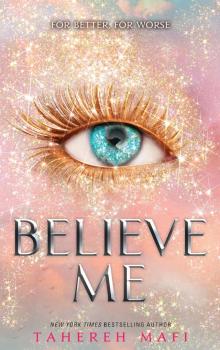 Believe Me
Believe Me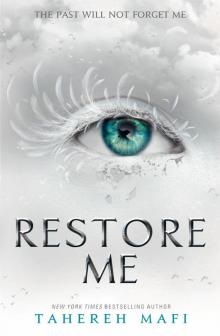 Restore Me (Shatter Me)
Restore Me (Shatter Me)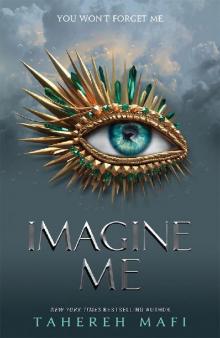 Imagine Me
Imagine Me An Emotion of Great Delight
An Emotion of Great Delight Find Me
Find Me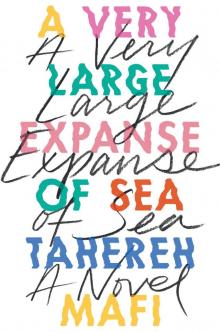 A Very Large Expanse of Sea
A Very Large Expanse of Sea Unravel Me: The Juliette Chronicles Book 2
Unravel Me: The Juliette Chronicles Book 2